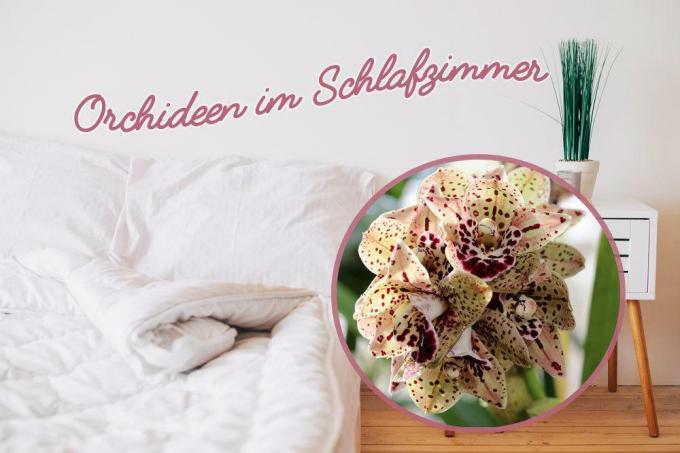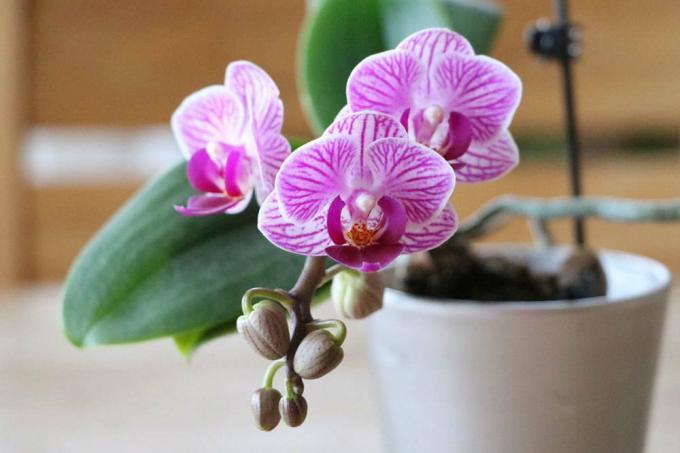
table of contents
- Plants in bedrooms
- Orchids in the bedroom
- Pollen problem
- Carbon dioxide
There are myths among plant lovers that cannot be eradicated. One of these myths is the claim that plants have no place in the bedroom. Or also: orchids in the bedroom are harmful to health. At least as often, however, one can find the claim that an orchid in the bedroom is not harmful, but rather healthy. So it's high time to grapple with this dubious orchid myth. Incidentally, there is no scientific evidence for either claim.
Plants in bedrooms
It is a mystery why plants are not grown in a bedroom or why they should be harmful there. In this context, there is often talk of any dangerous substances that are supposedly released by the plants and then inhaled by us while we sleep. If there were actually indoor plants that give off harmful substances, they are at least as dangerous in the living room. In principle, they have no business being in the apartment. Fortunately, such plants do not exist.
Sure, some exude poisonous juices or produce toxins in their stems and leaves. If you come into contact with these or even eat them, this can of course lead to considerable problems for humans and animals. But that also applies to the whole apartment and not just to the bedroom. Scientific research has now found that
Plants in the bedroom have a positive effect on the indoor climate because they can purify the air and ensure higher humidity. But that means that they would actually be healthy with it.
Note: Plants that produce pollen can be problematic for pollen allergy sufferers. In this group of people, the constant irritation during the pollen season in bedrooms can easily lead to significant sleep disturbances up to and including an asthma attack.
Orchids in the bedroom
The orchid is one of those plants that can make a significant contribution to improving the indoor climate in a bedroom. Specifically, it ensures a higher level of humidity. However, not every type of orchid is suitable for bedrooms. In these it is usually relatively cool. This coolness does not at all fit a type of plant that is at home in tropical and subtropical climes. However, there are a few species that can cope very well with cooler temperatures. These are among others:
- Cymbidium
- Cypripedium (lady's slipper)
- Oncidium (callus orchid)
- Phalaenopsis (moth orchid)
The latter is a species that is not only extremely robust, but also has no problems whatsoever with rather low temperatures or temperature fluctuations. However, like all orchid species, it requires a relatively large amount of light. If you want to place an orchid in the cool bedroom, you should do so close to the window or directly on the window sill, if possible. By the way, all orchids should also have a calming and mood-enhancing effect through their flowers. Especially shortly before going to sleep, this can possibly contribute to a better sleep. In this respect too, they were healthy and not harmful.
tip: An orchid should always be placed in bedrooms in such a way that it is almost impossible to knock over it in the dark at night. That could lead to considerable damage to the plant.
Pollen problem
Perhaps the myth that an orchid in the bedroom is harmful to health stems from the fact that the plant produces pollen. As already mentioned, it can very quickly become a torture for people who rely on pollen or Have an allergic reaction to pollen count. The associated irritation of the nasal mucous membranes and the respiratory tract are naturally particularly unpleasant at night and are perceived as extremely annoying. For these people, orchids in the bedroom are actually completely unsuitable. You should resort to other plants. The following are recommended, for example:
- Yucca palm
- Bow hemp
- A leaf
- Calla
- other non-flowering plants
It should also be remembered that orchids do not produce pollen all year round. A plant can possibly be moved to another room during the critical time.
Carbon dioxide
Yes, plants give off carbon dioxide - including orchids. The amount is so small, however, that there is absolutely no need to worry about suffocating in your sleep. In any case, winning the lottery is far more likely than suffocation from carbon dioxide released by plants. Except for pollen allergy sufferers, an orchid in the bedroom is absolutely harmless.



